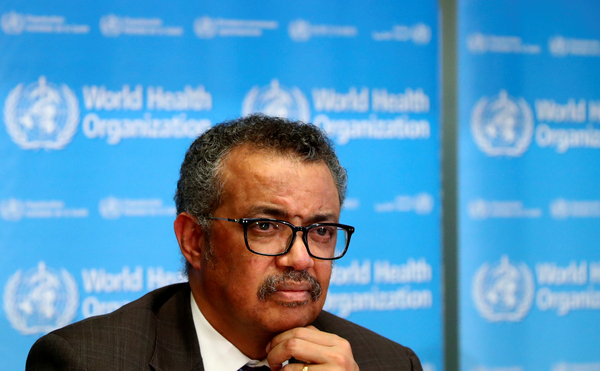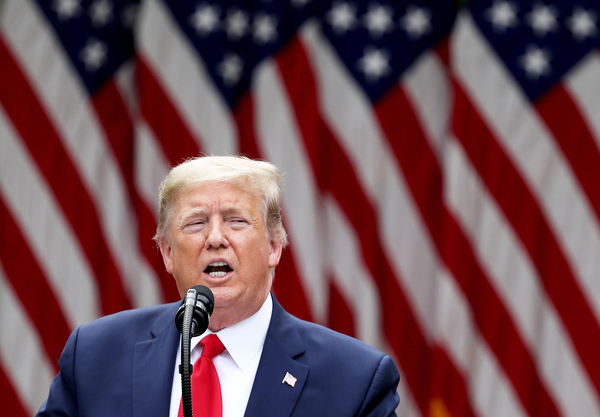WHO's measured reaction to Trump's pledge to cut U.S. ties to the agency
Go Deeper.
Create an account or log in to save stories.
Like this?
Thanks for liking this story! We have added it to a list of your favorite stories.

This story was updated on June 1 to include WHO's reaction from its daily press conference.
Tedros Adhanom Ghebreyesus, director-general of the World Health Organization, says he learned of President Trump's intentions of "terminating" the decades-long U.S. relationship with WHO through Trump's press briefing on Friday.
"The US government's and its people's contribution and generosity toward global health over many decades has been immense, and it has made a great difference in public health all around the world. It is WHO's wish for this collaboration to continue," Tedros said at a press conference Monday, offering no further comments when pressed.
At a press briefing in the Rose Garden on May 29, President Trump announced that he was halting U.S. funding and membership in the World Health Organization over its response to China's handling of the coronavirus epidemic.

"We will be today terminating our relationship with the World Health Organization and redirecting those funds to other worldwide and deserving urgent global public health needs," Trump said.
Turn Up Your Support
MPR News helps you turn down the noise and build shared understanding. Turn up your support for this public resource and keep trusted journalism accessible to all.
The decision came because WHO has "failed to make" reforms the U.S. requested, according to Trump. Last week, the president sent a letter to WHO's director-general, Tedros Adhanom Ghebreyesus, outlining his views on how the agency favors China and asking the organization to "commit to major substantive improvements within the next 30 days." It's not clear what specific reforms the U.S. has requested, because those discussions have not been made public. Nor did Trump say why he acted on the threat after one week rather than waiting a month.
The U.S. was a major force in founding WHO in 1948 and is the organization's top funder, providing around $450 million a year, according to Trump. The level of funding the U.S. provides to WHO has been a sore spot for Trump, who complained at the briefing that the U.S. pays significantly more than China but does not wield more power in the agency.
Global health experts said the president's choice to leave the global health governing body during a pandemic is a dangerous call. "This decision is really so short-sighted and ill-advised, and all it does is put American lives at risk," said Dr. Howard Koh, former assistant secretary for health in the Obama administration and now a professor at Harvard's T. H. Chan School of Public Health.
"I disagree with the president's decision," said Sen. Lamar Alexander, R-Tenn., chairman of the Senate Health, Education, Labor and Pensions Committee, in a statement after the announcement. "Withdrawing U.S. membership could, among other things, interfere with clinical trials that are essential to the development of vaccines, which citizens of the United States as well as others in the world need. And withdrawing could make it harder to work with other countries to stop viruses before they get to the United States."
Dr. Tom Frieden, former head of the U.S. Centers for Disease Control and Prevention, noted: "The United States helped create the World Health Organization. And we're turning our back on it — we're turning our back on the world. That makes us less safe, it makes the world less safe.
"Every country in the world has a veto at WHO — except now, perhaps the United States will not."
It's questionable whether the president can make a unilateral decision to withdraw from WHO.
"It is an overreach of his constitutional powers," said Larry Gostin, director of the O'Neill Institute for National and Global Health Law at Georgetown University. Gostin said he believes that the president may need congressional approval to terminate U.S. membership in the U.N. agency.
"The only situation where he can do this is if Congress had agreed beforehand to give these powers to the president," said Kelley Lee, a professor of public health at Simon Fraser University. "It is the role of legal advisers to inform the president on what authority he can exert. He is either not receiving good advice or not listening to it."
If the president follows through, Congress could sue him in federal court over the matter, Gostin said, but Trump will still have succeeded in halting U.S. funding until the courts decide.
"It's a monumental decision," Gostin said, and one that in his view is ill-timed as the epicenter of the pandemic moves to low- and middle-income countries where WHO's efforts to stem the pandemic are crucial. "To have that disruption and delay is unforgivable," he said, "It will cost lives."
Copyright 2020 NPR. To see more, visit https://www.npr.org.


